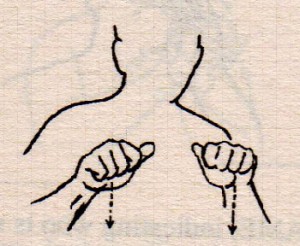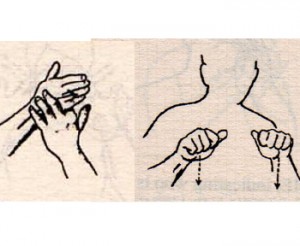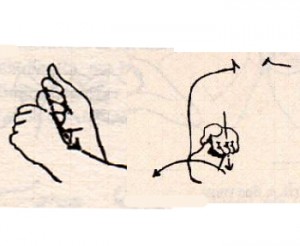Lesson 3 – Extreme Mission: Jesus Sends Out the Twelve
Series: The Life of Jesus
Extreme Life—For Older Students
LESSON OVERVIEW
Key Point: Jesus has a mission for you
Repeat this phrase throughout the lesson.
Bible Story: Matthew 10:1-31
Challenge Verse: Philippians 4:13—“I can do everything through Christ who gives me strength.”
————————————————————————————————————
ITEMS NEEDED
Each class needs the following:
1 banana—real or fake
Memory Verse Sign
NOTE: You will need a watch with a second hand to time students on the Opening Activity.
BEFORE CLASS
– Learn today’s memory verse using the sign language taught in this lesson.
– Have the banana in a convenient location.
– Pray for each student by name.
AS STUDENTS ARRIVE
– Greet each student by name as they enter.
– Give each student an attendance sticker for the attendance chart, and feel free to add guest names to the chart. This will give them a sense of belonging.
– Get to know any guests and help them fill out a guest form.
– Be sure to smile—Your smile and attitude sets the atmosphere as students enter.
The first 10 minutes of 3rd-6th grade classes should be used as an opportunity to build and deepen relationships with students. Relationships are the key to reaching this age group. Ask them specific questions about what is going on in their lives, joke with them, laugh with them, and play with them. Every class should have an activity going as soon as the students arrive. Each classroom should have games such as Jenga, Connect Four, etc. to use during this time. Also feel free to play group-jump rope, four-square, and other fun entry-activities.
OPENING ACTIVITY
Pass the Banana
Have your class sit in a circle on the floor.
Explain that you are going to play a game with a banana to see how fast they can pass it around the circle using only their feet. Time how fast they can do this. When the banana has gone around the circle one time, stop the game and tell the kids their time. Play this activity several times and be sure to tell them that you are going to play this game again at the end of class and see if they can beat their time. (You can even time them passing the banana around two or three times.)
Discussion
Ask the students: What was difficult about passing the banana? (It kept slipping; it was weird to use my feet that way; we dropped it a lot.)
SAY: Passing a banana with your feet is silly, but Jesus has big important things for you to do.
Ask the students: What difficult things might Jesus want you to do at school? (Tell people about Jesus; be nice to someone who’s new; show Jesus’ love by helping someone who’s hurt; pray before eating lunch; treat someone kindly who has treated you mean.)
SAY: After each of the following sentences, I will say 1-2-3. Then I want you to say hard or easy. There’s no right or wrong answers to these. What might be easy to you may be hard for someone else. God has made each one of you different, and even though these are things God wants all of us to do, it might be easier for some to do them than others.
To tell friends at school or on a ball team about Jesus: 1-2-3–Hard or Easy
To tell a teacher or coach about Jesus: 1-2-3–Hard or Easy
To tell an aunt, uncle, cousin, or grandparent about Jesus: 1-2-3–Hard or Easy
To be nice to someone who’s new at school: 1-2-3–Hard or Easy
To show Jesus’ love by helping someone who’s hurt: 1-2-3–Hard or Easy
To pray before eating lunch–even when you’re sitting with your friends and no one else is doing it: 1-2-3–Hard or Easy
To treat someone kindly who has treated you mean: 1-2-3–Hard or Easy
To stick up for someone who is being treated wrongly: 1-2-3–Hard or Easy
To give back a five dollar bill that you saw someone drop: 1-2-3–Hard or Easy
To give back a ten dollar bill that was mistakenly given to you as change in a store: 1-2-3–Hard or Easy
Some of the above statements may bring comments from your students. If so, feel free to take a few minutes to discuss the situations and tie in extra learning. For example, when you say, “To give back a five dollar bill that you saw someone drop: 1-2-3–Hard or Easy,” say that a student says, “I wouldn’t give it back. Finders-keepers!” Take this as an opportunity to ask: Has anybody ever lost anything important to you? How did you feel? What if someone found it but wouldn’t give it back? What do you think Jesus would do? What does the Bible say—To treat others the way you want to be treated, etc.
SAY: Whether you think the things above are hard or easy, it will always take courage to do them. Courage doesn’t mean that you’re not afraid, but that something is more important to you than being afraid. You might be afraid to tell someone about Jesus, but for them to know Jesus and go to heaven is more important to you than being afraid. And Jesus will always give you the courage you need to do anything He asks you to do.
Control Tool
SAY: When I say, “What’s your mission?” I want everybody to say, “Follow Jesus!”
Leader—“What’s your mission?” / Students—“Follow Jesus!”
Practice a few times.
SAY: God has an Extreme Mission for every one of you. He created you for a reason and has plan for your life. His mission for you is to follow Jesus— And part of following Jesus is the willingness to tell others about Him. This is the greatest adventure anyone can ever have. It’s not always easy, but Jesus will always give you the strength and courage you need to do anything He calls you to do.
CHALLENGE VERSE
Use the following sign language diagrams to learn and teach today’s verse:*
Read Philippians 4:13 from your Bible
“I can do everything through Christ who gives me strength.”
The Sign Language is below:
SIGN LANGUAGE MEMORY VERSE
Philippians 4:13
“I”
LESSON ACTIVITY
The Hungry Monkey
Have your students spread out in the classroom. Tell them that when you call a number, you want them to get into groups of that number. So if you call out a three, you want them to get into groups of three. Call out 4, 3, 2. The only reason you’re doing this is to get them in pairs in a manner where no one feels left out. If there is an extra student, then a teacher may need to play.
Choose one pair to be your volunteers. Have everyone else spread out across the room and tell them to link arms. Tell the partners to stand in one place. They can’t move. Designate one of your volunteers to be the Monkey and the other to be the Banana. Explain that the Monkey is hungry and will chase the Banana by hopping on one leg. The Banana can use both legs and will run away, but may link arms with one of the partners who is standing still. If the Banana does this, the other partner (the one who is now not linked with the Banana) becomes the Banana and must run from the Monkey. If the Monkey tags the Banana, they will switch roles. (To add variation, tell them that the Monkey can run (and not just hop) for 10 seconds any time you say, “The Monkey can run!”)
Discussion
Ask the students: What did you like about being a Monkey or a Banana? What didn’t you like? (I liked being the Monkey because I’m a fast runner; I didn’t like being the Monkey because I had to hop on one leg; I didn’t like being the Banana because I was afraid I’d get tagged.)
Ask the students: How did you feel when you were standing with a partner? (Safe; I could rest; Glad; Bored.)
Ask the students: Tell me about a friend who makes you feel safe and happy? (Answers will vary.)
SAY: Today we’re going to learn about how Jesus sent His disciples to tell people about God. That might have been a little scary, but Jesus sent each person with a friend. God gives us friends and it is important as you grow older that you choose friends who will encourage you to follow Jesus.
REPEAT after me: Right friends (Kids: Right friends) keep you (Kids: keep you) on the right track (Kids: on the right track).
Ask the students: How can you encourage your friends to follow Jesus? (Invite them to church; Tell them about Jesus; Talk about Jesus with them; Tell them what God is doing in your life or what you learned at church; Do what is right and tell them why you do what is right, etc.)
Control Tool
Leader—“What’s your mission?” / Students—“ Follow Jesus!”
BIBLE LESSON
SAY: Jesus sent some of his disciples on a mission. Everybody get your Bibles and get ready for a Bible Drill. (Guests may not know how to do this so an extra explanation may be needed. If so, give it to the whole class, so they don’t feel singled out or embarrassed. By now your regular students should be getting familiar with this routine.)
Ready—Find Matthew 10—Go!
Be sure to help them (or have them help each other) if some are having a hard time finding it. Let them know that it’s okay if they can’t find it quickly. The more they do it, the easier it’ll become.
Ask the students: Where is Matthew found in the Bible? (It’s the first book of the New Testament)
Ask the students: What are the other Gospels? (Refer them to the Bible Book Chart)
SAY: There are other sections in the New Testament also. (Briefly explain the sections of the New Testament as seen on the Bible Book Chart and show them where Philippians is found. Tell them that it is a letter Paul wrote to the Philippian people.)
Ask the students: Who remembers what Philippians 4:13 says?
(Review the sign language with them.)
KEY: Jesus will always give you the strength and courage you need to do anything He calls you to do.
Control Tool
Leader—“What’s your mission?” / Students—“Follow Jesus!”
SAY: In Matthew 10 Jesus prepared His disciples to send them on a mission to tell others about the kingdom of God and to do good deeds.
Choose 1 volunteer—to come stand next to you.
Ask the students: What is different about your volunteer and the twelve disciples? (There are many differences but one thing is the same: Everyone who has given their life to Jesus has been sent by Him to tell others about the kingdom of God and to do good deeds.)
Ask the students: What are some ways you can do tell others about Jesus and do good deeds?
Ask the students: What does God call people to do? (Live for Him. Talk about Him. Lead others to faith in Christ. Help those in need. He also calls some into full-time ministry, etc.)
Ask the students: What do you think God wants you to do this week? (Same answers as above. Living for Jesus is not something you do just when you grow up. Living for Jesus begins now.)
Ask the students: What do you think God will give you to help in this mission? (The strength and courage to do anything He calls you to do.)
SAY: Jesus is our example and He will always give you everything you need to do anything He calls you to do.
Control Tool
Leader—“What’s your mission?” / Students—“Follow Jesus!”
LESSON ACTIVITY
Pass the Banana, part 2
Play the “Pass the Banana” game again and see if your class can beat their previous time.
SAY: If you have given your life to Jesus, you have the Gospel.
Ask the students: Who remembers what “Gospel” means? (Good News)
SAY: You have Good News that Jesus can save your friends and that they can know for sure that they are going to heaven too. But to bring your friends to Jesus, you have to pass it on.
Ask the students: What if someone in the game had stopped passing the banana? (Everyone would have lost)
SAY: In the same way, when you don’t tell others about Jesus, it affects more than just you. Telling others about Jesus, or witnessing as some call it, is a privilege that you get. It’s fun and exciting that God can use you to change someone’s life.
SAY: After each of the following statements say, “Get to” or “Got to.” Again, there’s no right or wrong answer. It’s how you feel about what I’m saying. For example, if I said, “Clean your room.” Is that something you get to do or something you’ve got to do”?
Take out the trash
Eat at McDonalds
Wash the dishes
Do your homework
Eat Ice Cream
Go to school
Play in a ballgame
Go to church
Read your Bible
Have a friend spend the night
Tell others about Jesus
SAY: Hopefully, going to church, reading your Bible, and telling others about Jesus is something you realize that you get to do. These things are fun and exciting for someone who loves Jesus and is walking with Him. Jesus didn’t force his disciples to go out two by two. He just gave them the chance to do it, and in the same way, Jesus gives us chances to tell others about Him nearly every day.
Control Tool
Leader—“What’s your mission?” / Students—“Follow Jesus!”
KEY Point: And Jesus will always give you the courage you need to do anything He asks you to do.
Ask the students: Who told you about Jesus and led you to Christ? (Have a couple of volunteers answer but don’t put anyone on the spot.)
TELL: the students about who had the strongest influence on you giving your life to Christ.
Then SAY: Part of God’s Extreme Mission for you is to tell others about Jesus. Someone took the time and had the courage to tell you about Christ. Aren’t you glad they did? But who have you passed it to? Remember, in the game, if one person stopped, nobody else in line behind them would get the banana. But when you passed it, then someone else passed it, then someone else passed it and on and on. You might lead someone to Christ who will lead someone to Christ who will lead a hundred more to Christ who will lead a thousand more to Christ—all because you let God use you. That’s part of the adventure of being on an Extreme Mission with God—He will do amazing things through you anytime, any place, if you’ll let Him.
BIBLE SKILLS
Ask the students—Who remembers where our verse was found last week? (Answer: Psalm 119:11)
Ask the students—Who remembers what it said? (Answer: “I have hidden your word in my heart that I might not sin against you.”)
SAY: Everybody get your Bibles and get ready for a Bible Drill. I’m going to tell you a book of the Bible and I want you to try to find it. When I say, “Ready,” hold the Bible between both hands, but you cannot open it. Then I will say a book of the Bible and a chapter and “Go.” If you open your Bible before I say, “Go,” you will be out. Once you find the book I ask for, raise your hand.
Ready…Psalm 119:11
Have the students close their Bibles.
Ask the students—Where was our Bible verse found today? (Answer: Philippians 4:13)
Ask the students—Is it in the Old or New Testament?
Ask the students—What part of the New Testament?
Ask the students—Does anybody remember who wrote it? (Paul—If you have time, point him out on the Bible Time Line.)
SAY: Everybody get your Bibles ready. And remember to wait until I say, “Go.”
Ready…Philippians 4:13–Go!
NOTE: Be sure to congratulate all your students on how they are doing and help any guests that may be in your class. We don’t want them to feel out-of-place..
PRAYER TIME & WRAP-UP
Control Tool
Leader—“What’s your mission?” / Students—“Follow Jesus!”
SAY: And He’ll always give you the strength you need to do anything He calls you to do. Let’s thank Jesus for being so good to us.
List Prayer Requests
Be sure to pray specifically for each request.
EXTRA TIME
Use any extra time to help your students memorize the verse for today.
NOTES*
Lesson adapted in part from Group Publishing, Lava, Lava Island VBS, “Jesus Brings Hope” Day 1, 2004.
Sign Language taken from: Sternberg, Martin. “American Sign Language Concise Dictionary.” New York: HarperPerennial, 1994.
Follow Us:
Share these resources:









